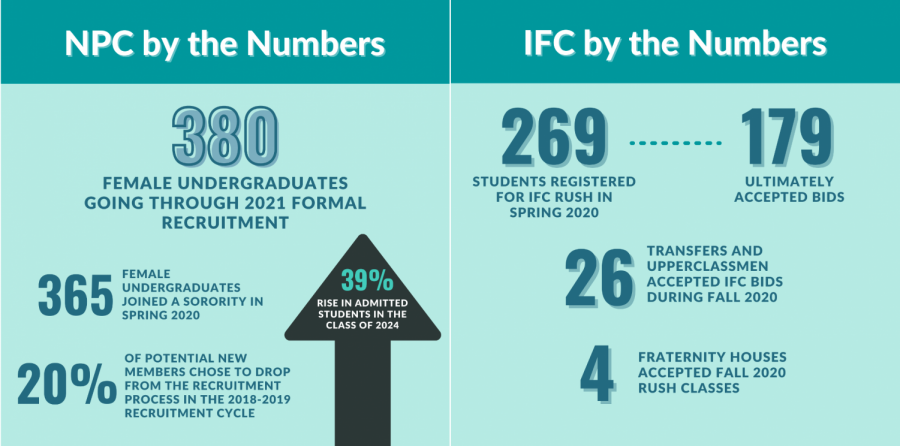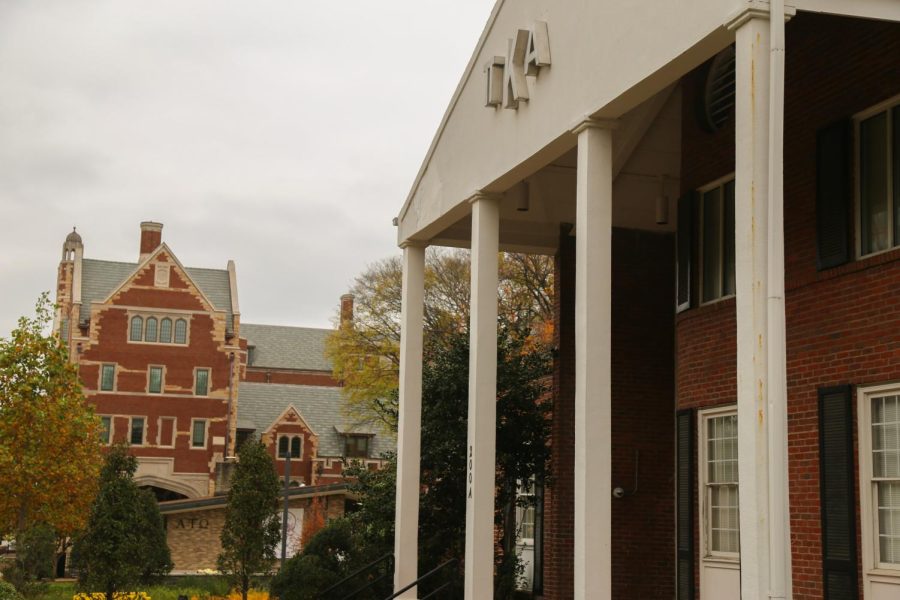Rush season has finally arrived, and it’s just as atypical as everything else this school year. Strict COVID-19 guidelines requiring proper social distancing have thrown a wrench in traditional Greek operations, as have the efforts and prevalence of the Abolish Vanderbilt IFC and Panhellenic Greek Life (AGL) movement on campus. This combination of challenges likely contributed to the reduction of students intending to rush in 2021. Despite this, fraternities and sororities are ready to distribute bids for their new pledge classes.
The AGL movement gained traction in July after a video circulated on social media of a Vanderbilt student saying a racial slur during spring break in Gulf Shores, Alabama, with Greek life members present. Members of the movement argued that this was just one of many instances reflecting greater issues within the Greek system and continued pushing to end Greek life.
Six months later, fraternities and sororities plan to continue their chapters and their rush events in 2021. However, the AGL movement affects the way these chapters operate on campus and leaves many students reevaluating their decision to participate in Greek life.
Numbers on current rush enrollment
In spring 2020, 365 female Vanderbilt students joined as official new members of a sorority. There are 380 female undergraduates rushing this year, according to junior Natalie Wight, vice president of marketing in Zeta Tau Alpha. This does not take into account the number of women who will choose to drop over the course of the process, which was approximately 20 percent of Potential New Members (PNMs) in the 2018-2019 rush cycle. This decline in expected new members is notable considering the overall 39 percent rise in total admitted students for the class of 2024.
There are nine fraternity houses on campus as of December 2020, and one additional fraternity, Alpha Epsilon Pi, will come back with the intention of colonizing from scratch, per Interfraternity Council (IFC) president John Blang. Only four fraternity houses accepted fall rush classes this year: Kappa Alpha, Kappa Sigma, Lambda Chi Alpha and Pi Kappa Alpha. This was largely due to extra time needed to grow accustomed to virtual rush, according to Blang.
26 transfers and upperclassmen accepted IFC bids this fall semester. Last spring, 269 students registered for IFC rush, with 179 ultimately accepting bids. Numbers are not yet clear for final rush classes this spring, which is open to first years as well, but Blang reports that recruitment chairs have been pleased so far with the outcome.
“All of our recruitment chairs and everyone involved has been very happy with how fall recruitment went this year, given COVID-19 and everything,” Blang said. “The feeling has been very positive so far, both from our end and from first years.”
National Pan-Hellenic Council (NPHC) chapters will be hosting Intake Seminars, which are necessary to obtain membership, until Mar. 15. For this reason, their projected membership numbers have not been finalized. AGL movement efforts were not aimed towards limiting NPHC enrollment.
Format and protocol for Panhellenic and IFC rush
Both sororities and fraternities will be giving out bids in the first few weeks of this semester. However, sororities have taken a completely virtual approach to rush, while fraternities have not. Panhellenic sororities will be hosting rush via Zoom from Jan. 30 until virtual Bid Day on Feb. 7, per the Office of Greek Life’s website. PNMs will engage in four rounds of recruitment focusing on the different elements of membership in Greek houses such as philanthropy and sisterhood, similar to years prior.

Alternatively, fraternities invited students to meet in-person with current members throughout the fall semester, inviting first years to sign up for 15-minute time slots at the house to engage socially distanced and in masks with rotating brothers. Like sororities, IFC Bid Day is also on Feb. 7 but will lack the traditional in-person events due to COVID-19, per Blang.
Students’ hopes for rush this year
First years intending to proceed with rush are doing so with the hopes of making close friends after fall semester. The social prospect of Greek life under the influence of COVID-19, however, remains in question due to guidelines making typical party scenarios impossible.
PNMs interviewed seemed to have a range of attitudes towards the rush process. Male first-year students reported that they did not feel at all hesitant about being involved in Greek life, seeing it as critical because of the parties hosted by IFC frats. They prioritized qualities like “tight brotherhood” and future connections when visiting Greek houses.
Other PNMs, particularly young women rushing Panhellenic sororities, have expressed more hesitation, noting concerns about the negative social impacts of rushing after meeting friends over the course of the first semester. The perceived exclusivity of Greek life has been a turn-off for involvement, but many have made the decision to rush anyway.
The majority of first years we spoke with have a generally positive attitude towards joining Greek life. Many said they look forward to meeting new people at their houses, contributing in unique ways and feeling comfortable in their environment. Others added that they have heard rumors that the rushing process will not be as intense or as competitive as previous years.
Effect of AGL on current Greek life
The AGL webpage reports that, by the onset of the fall semester, over 300 Greek members had dropped, most of whom are upperclassmen. No fraternities or sororities have removed their charters since last spring as a result of dropped members. Joy Tang, a junior in Zeta Tau Alpha, went against the grain by deciding to stay in Greek life because of the leadership position she holds.
“I think at the end of the day what made me stay was the fact that I’m on exec,” she said. “Through this position, I can try and create what change I could in that respect. Having a leadership position, I wanted to see what I could do with it first before I decided to drop.”
However, her experience remains very different from a year ago. As a result of the movement and COVID-19, events remain entirely virtual and, Tang said, many of her friends have dropped.
“It’s hard to sometimes differentiate between [changes being made because of] Abolish Greek Life and COVID because they were happening simultaneously,” she said. “The chapters are smaller, and a lot of my friends have dropped; so, it makes it feel different.”
She believes that the effect of the movement will be evident in the number of students that decide to rush in comparison with previous years. The current stigma behind Greek life may dissuade some students from joining but also leaves room for necessary introspection.
“I think there was an inclination to do Greek life before and I don’t think that’s necessarily the best thing for the campus,” Tang said. “But now, having to sit back and say, ‘You know, I do actually want to go through recruitment, or actually, I’m happier not going through recruitment’— being able to have that conversation with yourself without external pressure is really important.”
As another upperclassmen sorority leader, Wight also sees her involvement in Greek life as an opportunity to make change through her leadership position. As vice president of marketing, she said her involvement in Zeta Tau Alpha was a decision that she constantly challenges. The dormancy of Greek events due to the pandemic allotted the chapters necessary time to focus on these changes.
“I actually believe that all the changes brought by the pandemic present a great opportunity to initiate lots of other positive changes,” Wight said. “If we have to change so much already to keep our chapters operating during a pandemic, why can’t we use this time to make changes that have been needed for a while now?”















